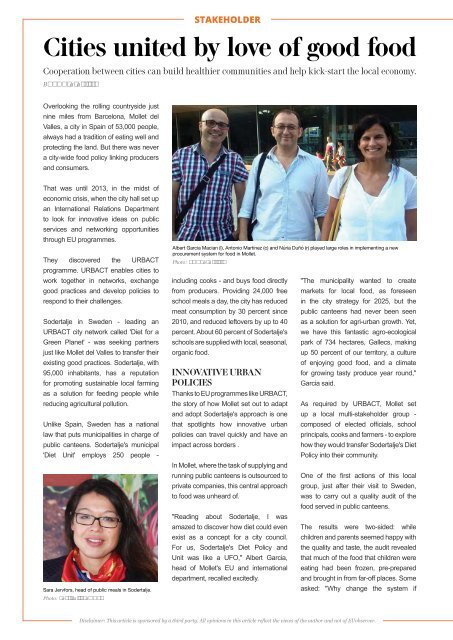Regions & Cities: The EU Agencies Race
EUobserver's 2017 Regions & Cities magazine takes a closer look at EU agencies and the benefits for cities and regions to host them. The UK leaving the EU has prompted a scramble for the European Medicines Agency and the European Banking Authority among most of the remaining member states. But what makes a city competitive? Which cities stand a good chance to become the new hosts? And what do EU agencies bring to the local economy?
EUobserver's 2017 Regions & Cities magazine takes a closer look at EU agencies and the benefits for cities and regions to host them. The UK leaving the EU has prompted a scramble for the European Medicines Agency and the European Banking Authority among most of the remaining member states. But what makes a city competitive? Which cities stand a good chance to become the new hosts? And what do EU agencies bring to the local economy?
You also want an ePaper? Increase the reach of your titles
YUMPU automatically turns print PDFs into web optimized ePapers that Google loves.
<strong>Cities</strong> united by love of good food<br />
Cooperation between cities can build healthier communities and help kick-start the local economy.<br />
Baa<br />
Overlooking the rolling countryside just<br />
nine miles from Barcelona, Mollet del<br />
Valles, a city in Spain of 53,000 people,<br />
always had a tradition of eating well and<br />
protecting the land. But there was never<br />
a city-wide food policy linking producers<br />
and consumers.<br />
That was until 2013, in the midst of<br />
economic crisis, when the city hall set up<br />
an International Relations Department<br />
to look for innovative ideas on public<br />
services and networking opportunities<br />
through <strong>EU</strong> programmes.<br />
<strong>The</strong>y discovered the URBACT<br />
programme. URBACT enables cities to<br />
work together in networks, exchange<br />
good practices and develop policies to<br />
respond to their challenges.<br />
Sodertalje in Sweden - leading an<br />
URBACT city network called 'Diet for a<br />
Green Planet' - was seeking partners<br />
just like Mollet del Valles to transfer their<br />
existing good practices. Sodertalje, with<br />
95,000 inhabitants, has a reputation<br />
for promoting sustainable local farming<br />
as a solution for feeding people while<br />
reducing agricultural pollution.<br />
Unlike Spain, Sweden has a national<br />
law that puts municipalities in charge of<br />
public canteens. Sodertalje's municipal<br />
'Diet Unit' employs 250 people -<br />
<br />
Photo: ota o<br />
<br />
<br />
Photo: aa<br />
including cooks - and buys food directly<br />
from producers. Providing 24,000 free<br />
school meals a day, the city has reduced<br />
meat consumption by 30 percent since<br />
2010, and reduced leftovers by up to 40<br />
percent. About 60 percent of Sodertalje's<br />
schools are supplied with local, seasonal,<br />
organic food.<br />
INNOVATIVE URBAN<br />
POLICIES<br />
Thanks to <strong>EU</strong> programmes like URBACT,<br />
the story of how Mollet set out to adapt<br />
and adopt Sodertalje's approach is one<br />
that spotlights how innovative urban<br />
policies can travel quickly and have an<br />
impact across borders .<br />
In Mollet, where the task of supplying and<br />
running public canteens is outsourced to<br />
private companies, this central approach<br />
to food was unheard of.<br />
"Reading about Sodertalje, I was<br />
amazed to discover how diet could even<br />
exist as a concept for a city council.<br />
For us, Sodertalje's Diet Policy and<br />
Unit was like a UFO," Albert Garcia,<br />
head of Mollet's <strong>EU</strong> and international<br />
department, recalled excitedly.<br />
"<strong>The</strong> municipality wanted to create<br />
markets for local food, as foreseen<br />
in the city strategy for 2025, but the<br />
public canteens had never been seen<br />
as a solution for agri-urban growth. Yet,<br />
we have this fantastic agro-ecological<br />
park of 734 hectares, Gallecs, making<br />
up 50 percent of our territory, a culture<br />
of enjoying good food, and a climate<br />
for growing tasty produce year round,"<br />
Garcia said.<br />
As required by URBACT, Mollet set<br />
up a local multi-stakeholder group -<br />
<br />
principals, cooks and farmers - to explore<br />
how they would transfer Sodertalje's Diet<br />
Policy into their community.<br />
<br />
group, just after their visit to Sweden,<br />
was to carry out a quality audit of the<br />
food served in public canteens.<br />
<strong>The</strong> results were two-sided: while<br />
children and parents seemed happy with<br />
the quality and taste, the audit revealed<br />
that much of the food that children were<br />
eating had been frozen, pre-prepared<br />
and brought in from far-off places. Some<br />
asked: "Why change the system if

















